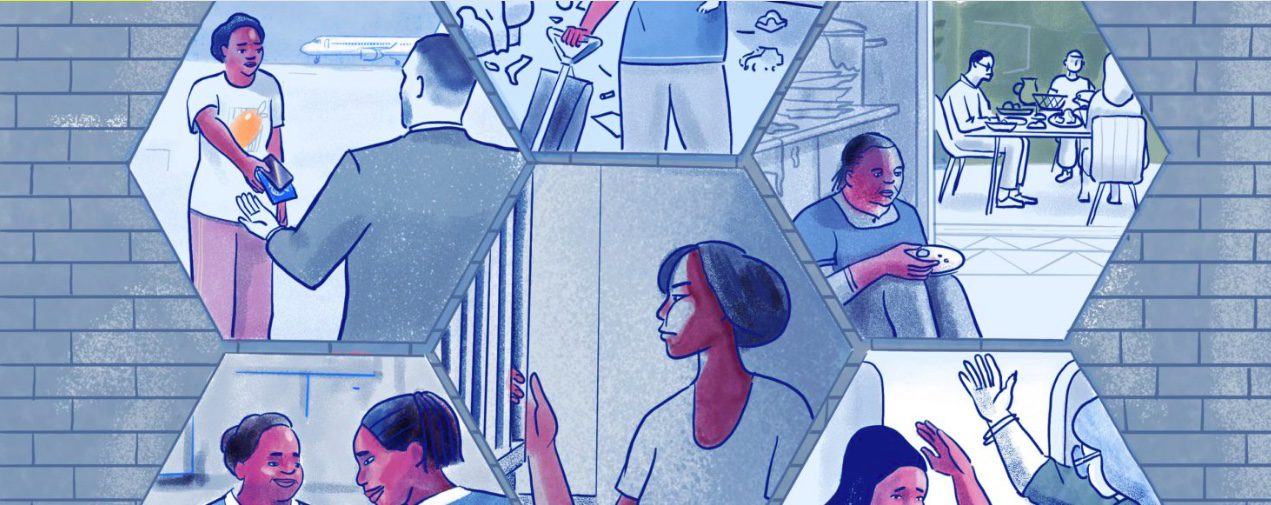
Left Out: The Hidden Lives of Kenyan Domestic Workers in Saudi Arabia
Saudi Arabia is home to nearly 4 million domestic workers, including 1.2 million women and 2.7 million men from Africa and Asia who play an essential role in enabling the country’s economic development and supporting family life. Yet, the experiences of Kenyan women outlined in this report illustrate how many of these workers endure gruelling, abusive and discriminatory working conditions, often amounting to forced labour and human trafficking.
Abusive recruiters sold the women interviewed for this report a dream before plunging them into an isolated, segregated reality of severe abuses being perpetrated in private households. They exploited the pressures shaping the lives of women and restricting their choices – soaring unemployment, few opportunities at home in Kenya and children to feed and educate. Once in Saudi Arabia they routinely withstood working days of 16 hours and more, with little rest and often not a single day off for months or even years. Some could never leave the house, and many were almost entirely cut off from the outside world. In their workplace, which was also their home, there was no escape from verbal abuse, demeaning treatment, racism, discrimination and extreme exploitation. In many cases, they were physically or sexually assaulted. Some were raped by their male employers and their sons. Many endured delayed or non- payment of their meagre wages. Almost all had their passports confiscated on arrival, making it virtually impossible for them to flee abusive employers, none of whom were held to account.
The cumulative impact of these experiences left deep scars on the women, some of whom struggle today with chronic health issues and the legacy of the trauma they experienced in Saudi Arabia.
This report is primarily based on in-depth interviews conducted in-person in 2024 with 72 Kenyan women who had recently returned from Saudi Arabia and were being supported by organizations in relation to the abuses they had faced. It also reflects discussions with civil society organizations in Kenya, analysis of Saudi Arabia’s legal framework, literature about the East African slave trade and its legacies, and reviews of reports from UN treaty bodies, the International Labour Organization (ILO), and international, regional and national NGOs. Amnesty International wrote to the Saudi Arabian authorities, requesting information about their laws and recent reforms, but received no response. The organization met with Kenyan authorities in March 2024 to discuss initial research findings but did not receive a reply to subsequent written requests for further information.
While this report does not contend that all domestic workers in Saudi Arabia face harsh working conditions, nor that all employers of domestic workers are abusive, it does bring to light patterns of serious abuse facilitated by an immigration and labour system which is highly permissive in granting excessive power over women working in private households while denying them meaningful recourse to free themselves from dangerous situations and hold abusive employers to account.
Most of the women interviewed by Amnesty International migrated due to economic hardship and family support needs. With nearly 40% of Kenyans living below the poverty line in 2022, the government has increasingly encouraged youth to seek jobs abroad to address high unemployment. Between 2020 and 2022, remittances from Saudi Arabia more than doubled, and Kenyan officials estimate there are up to 200,000 of its nationals residing there under regular migration status, including more than 150,000 domestic workers, most of whom are women.
The severe – and in many cases criminal – abuses faced by the women interviewed for this report are enabled by several factors. First, despite some limited changes to the kafala sponsorship system, – a labour migration system that binds foreign workers to their employers who act as their official sponsors – it continues to entrap domestic workers, making them almost totally dependent on their employers for every aspect of their lives and largely unable to change jobs or leave the country without their employer’s permission. Second, their abuse is facilitated by the exclusion of domestic workers from Saudi Arabia’s Labour Law, which results in the most marginalized workers in some of the most vulnerable situations being afforded weaker protections than their counterparts in other sectors. Third, the abuses are compounded by the weakness of recent labour reforms and a near-total absence of effective enforcement mechanisms for the safeguards that do exist for domestic workers. Finally, they are underscored by the structural and systemic racism that persists in Saudi Arabia, including racial hierarchies engendered by the kafala system and broader pervasive social attitudes.
